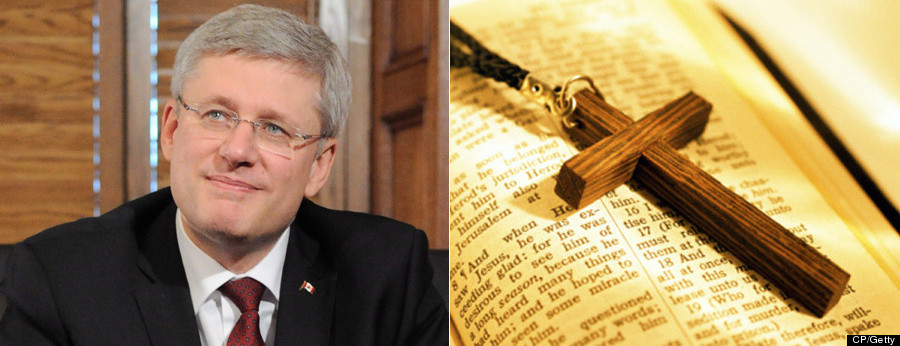Liberal MP John McKay has come out swinging against those who have suggested Prime Minister Stephen Harper's religion influences his policy choices.
McKay, a Christian who voted against same sex marriage, takes issue with Lawrence Martin's widely-read column in the Globe and Mail in which the columnist muses about whether Harper's evangelical faith might be shaping his government's policies on climate change and the environment.
While the MP for Scarborough—Guildwood dismisses Lawrence's argument that there may be a link between "Harper’s evangelicalism and his anti-evidence, anti-science attitudes" as "profoundly wrong," he spends much of the rest of his opinion piece for iPolitics criticizing the prime minister for not being more influenced by his religious beliefs.
"Mr. Harper’s anti-rational, anti-scientific public policies do not generate themselves from his membership in the Christian & Missionary Alliance Church. Were he a more serious evangelical it might well be that some of his more excessive public policy initiatives in such diverse areas as foreign aid, treatment of accused criminal persons, or refugee claimants would lead him in the opposite direction. He seems to have a limited Biblical understanding of how to treat “the poor and oppressed."
McKay argues Harper's ideology is not faith-based, but rather rooted in a narrative which "seeks to change the face of our nation" to make it more warlike and vengeful.
Martin's article that brought Harper's religion to centre stage was itself a response to an article in B.C.'s The Tyee. In it, Andrew Nikiforuk compares Harper's Tories to the American evangelicals who have been so successful in controlling the national conversation south of the border.
Nikiforuk describes Harper's Missionary Alliance Church as believing that "the free market is divinely inspired and that non-believers are 'lost.'" The church was founded by Albert Simpson, a Canadian Presbyterian pastor, in 1887. It officially became a separate denomination in the 1970s and now has around 2,000 congregations scattered all over the globe, according to Maclean's.
Harper has remained mostly mute on the subject of his faith, but it's common knowledge that he attends services at the East Gate Alliance church in Ottawa's Vanier neighbourhood.
In 2006, however, Harper shared his thoughts about the intersection of church and state with Faith Today, a publication from the Evangelical Fellowship of Canada.
"In recent years, some politicians and commentators have asserted that in order to maintain the separation of church and state, legislators should not be influenced by religious belief. Leaving aside the fact that the separation of church and state is an American constitutional doctrine, not part of Canada's legal or political tradition, the notion of separation refers to the state not interfering in religious practice and treating all faith communities impartially. It does not mean that faith has no place in public life or in the public square."
So it seems Harper and McKay both agree faith should influence a politician's public beliefs. They just disagree about what those beliefs should be.
Original Article
Source: huffington post
Author: Michael Bolen
McKay, a Christian who voted against same sex marriage, takes issue with Lawrence Martin's widely-read column in the Globe and Mail in which the columnist muses about whether Harper's evangelical faith might be shaping his government's policies on climate change and the environment.
While the MP for Scarborough—Guildwood dismisses Lawrence's argument that there may be a link between "Harper’s evangelicalism and his anti-evidence, anti-science attitudes" as "profoundly wrong," he spends much of the rest of his opinion piece for iPolitics criticizing the prime minister for not being more influenced by his religious beliefs.
"Mr. Harper’s anti-rational, anti-scientific public policies do not generate themselves from his membership in the Christian & Missionary Alliance Church. Were he a more serious evangelical it might well be that some of his more excessive public policy initiatives in such diverse areas as foreign aid, treatment of accused criminal persons, or refugee claimants would lead him in the opposite direction. He seems to have a limited Biblical understanding of how to treat “the poor and oppressed."
McKay argues Harper's ideology is not faith-based, but rather rooted in a narrative which "seeks to change the face of our nation" to make it more warlike and vengeful.
Martin's article that brought Harper's religion to centre stage was itself a response to an article in B.C.'s The Tyee. In it, Andrew Nikiforuk compares Harper's Tories to the American evangelicals who have been so successful in controlling the national conversation south of the border.
Nikiforuk describes Harper's Missionary Alliance Church as believing that "the free market is divinely inspired and that non-believers are 'lost.'" The church was founded by Albert Simpson, a Canadian Presbyterian pastor, in 1887. It officially became a separate denomination in the 1970s and now has around 2,000 congregations scattered all over the globe, according to Maclean's.
Harper has remained mostly mute on the subject of his faith, but it's common knowledge that he attends services at the East Gate Alliance church in Ottawa's Vanier neighbourhood.
In 2006, however, Harper shared his thoughts about the intersection of church and state with Faith Today, a publication from the Evangelical Fellowship of Canada.
"In recent years, some politicians and commentators have asserted that in order to maintain the separation of church and state, legislators should not be influenced by religious belief. Leaving aside the fact that the separation of church and state is an American constitutional doctrine, not part of Canada's legal or political tradition, the notion of separation refers to the state not interfering in religious practice and treating all faith communities impartially. It does not mean that faith has no place in public life or in the public square."
So it seems Harper and McKay both agree faith should influence a politician's public beliefs. They just disagree about what those beliefs should be.
Original Article
Source: huffington post
Author: Michael Bolen

No comments:
Post a Comment